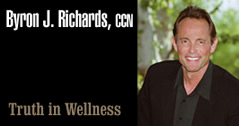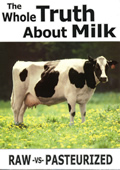BIOIDENTICAL
HORMONES - HELPFUL OR HARMFUL?
PART 2 of 2
By
Byron J. Richards, CCN
July 1, 2009
NewsWithViews.com
Hormones decline with age. The simplistic idea of replacing something that is apparently missing makes sense to many people, especially when a lab test can show that the hormone levels are lower than a younger person’s or when taking the hormone suppresses a symptom. And that is where the simplicity ends – and the risks begin to elevate.
The problem is that the efficient function of hormones within your body also declines with age. This means that replacing hormones can have unpredictable effects, some of which are outright dangerous. If hormone receptors aren’t working right or your hormonal symphony is all messed up then how do you know how any particular hormone is going to behave in your body? You don’t, and neither does anyone else, regardless of what any hormone-level lab test happens to say.
For example, the primary reason a woman will go on estrogen (estradiol) is to suppress hot flashes. This is the main reason Wyeth can still sell a billion dollars of horse urine extract every year.
Hot flashes are a side effect of the elevation of FSH, the brain signal that is trying to ripen an egg. As you age the receptors in your brain don’t sense estrogen levels as well, meaning that higher levels of estrogen are common as menopause approaches. This results in heavier periods, breast swelling, and other signs of estrogen dominance. This can readily result in a situation of hot flashes and surplus estrogen. Remember from Part 1, this estrogen excess is already a risk pattern for female cancer.
At some point menstrual cycles will lighten, become erratic, and eventually stop. Estradiol levels are dropping during this time, as eggs are no longer being ripened. That is normal. Hot flashes may occur because your brain has not quite got it figured out yet that menstrual cycles are finished, thus it keeps sending out the FSH signal even though the ovaries aren’t responding very well. You aren’t through menopause until your brain decides it doesn’t need to ripen eggs anymore.
Any woman can stop hot flashes by taking estradiol, as it is the precise form of estrogen that turns off the FSH signal. Doing so is not necessarily a good idea. First of all, it prevents a woman from going through the very natural process of transition. She is now functionally addicted to a level of estradiol her body no longer produces. If she tries to stop, the hot flashes will come back and her body will keep trying to run menstrual cycles (even if she is 70!).
As long as she keeps suppressing symptoms by taking estradiol, she is delaying a natural process and exposing her body to abnormal estradiol – automatically placing her into a high cancer risk profile.
In my opinion estradiol, including bioidentical estradiol, should never be used by women to suppress hot flashes and interfere with the natural process of transition. I also think that estrone is another form of estrogen that should never be used, as fat cells readily make estrone and most women have no problem in this category. The only form of estrogen women should ever consider using is estriol, which I will explain shortly.
There are many approaches a woman can take to reduce hot flashes that do not get in the way of the natural process of transition. These include better overall health habits, improved diet, more sleep, refreshing exercise, stress management, adrenal support nutrition, thyroid support nutrition, and correcting any nagging health problem that is draining energy.
For example, many women with hot flashes report them going away simply by following the five rules of the Leptin Diet®. This works because not snacking and not eating after dinner at night improve general hormone efficiency and energy utilization – actually enabling better energy from less food. Violating the five rules leads to abnormal cravings for food, elevation of brain-related craving signals such as NPY (neuropeptide Y). NPY can cause FSH levels to rise independent of estrogen issues. Thus, NPY-related food cravings are a common contributing factor to hot flashes at menopause.
Even adding some extra calcium can help lower NPY, and thus reduce hot flashes. Any there are many excellent nutrients that help reduce hot flashes – several of my favorites are chaste berry, gamma oryzanol, and inosine. These either help or they don’t, but they do not interfere with menopause.
On the other hand soy and other high-level concentrates of plant estrogens (like dong quai or red clover) can be very confusing to your brain’s regulation of menopause – oftentimes starting hot flashes or making them worse. Some of these plant estrogens work for some women but pay attention if you try them, as the results are often the opposite.
In my way of looking at this issue the natural thing to do is support your body so that you get through the very normal and natural process of menopause with a minimal amount of discomfort and with a high level of health – including bone health.
It is not natural or normal to produce estradiol in the amounts required for menstrual cycles after a certain point. It is fictitious that taking abnormal levels of estradiol has anything to do with healthy aging. To the contrary, not only does it get in the way of normal transition – it carries serious cancer and heart disease risks.
Avoid Taking Growth Hormone
Suzzane Somers starts her day injecting herself with growth hormone (IGF1). It is quite true that growth hormone levels decline with age. Indeed, growth hormone injections are a centerpiece of the strategy promoted by “anti-aging” clinics. Promotional hype by these clinics often involves an advertisement of an older person looking much fitter than is typical for their age. It is an extremely high-risk protocol, as the use of IGF1 is clearly linked to an increased risk of diabetes, potential fueling of cancer development and progression, cancer mortality, and breast cancer – a far cry from anything to do with anti-aging.
It may seem odd that such terrible health consequences can result from taking a bioidentical hormone that is declining with age. And that is precisely why individuals need to understand health in general and their own health situation much better before subjecting themselves to an unproven experiment.
Hormones like IGF1 have multiple receptors they can bind to, and many people have gene-related differences in how this works. If a person has the wrong receptors getting the hormone, then problems will follow. There is no clear-cut way to determine in advance which receptors are going to be activated, although problems are more likely in a person who has inflammatory gene signals activating which is reflective of a general wear and tear trend. Lab tests showing IGF1 levels are irrelevant for predicting potential problems. Any person who tests low on an IGF1 test, which would be a lot of people, could then embark upon a program of hormone replacement that readily fuels cancer.
Growth hormone (GH) is produced in your pituitary gland in response to growth hormone releasing hormone (GHRH), a signal coming from your hypothalamus gland. GHRH is one of the oldest hormonal signals in human evolution. As the gene encoding GHRH evolved, its “children” became insulin, glucagon, and various other signals that affect reproduction. Thus, the activity of GH is intimately involved with fuel utilization and reproduction, essential features that allow survival. Getting it to work in your favor is of the utmost importance to your health.
When GH is released by your pituitary gland it travels to your liver where it activates a family of hormonal signals that help carry out repair and rejuvenation of your body. True to the family tree, these signals look almost identical to insulin. The primary signal made by your liver that reflects GH activity is called insulin-like growth factor 1 (IGF1). IGF1’s main role in a healthy person is to facilitate growth, repair, and cell proliferation. IGF1 is the bioidentical substance that is often used as hormone replacement therapy.
Problems with IGF1 occur within the health context of the individual. There is a rather clear recipe for disaster. It is a mixture of insulin resistance and obesity (driven by leptin resistance), estrogen dominance (as explained in Part 1), and higher levels of IGF1. Each one of these issues, by itself, is associated with an increased risk of breast cancer. If a person is taking IGF1, has insulin resistance (which is typical in Americans), and estrogen dominance, then the odds of having a cancer problem with long term use are very high.
In a JAMA study of 57 women and 74 men, ages 65 to 88, IGF1 was given over a 26-week period. While body fat declined during the study there were only marginal increases in strength – indicating the IGF1 was not performing normally (not binding to the ideal receptors). Indeed, there was a dramatic increase in insulin resistance and diabetes in this relatively short period of time. By definition, this means that a critically important fat hormone called adiponectin had to be declining in response to the IGF1, as this invariably occurs when insulin resistance sets in. Low adiponectin is now associated with the invasiveness of breast cancer.
Many older women already have a significant problem with insulin resistance, meaning they will be at extreme risk for developing breast cancer in response to taking IGF1 in an effort to turn back the clock. Suzzane Somers, with her history of breast cancer, is an example of someone who is in a terribly high risk category from the daily use of IGF-1 – as once your body has had breast cancer it is a lot easier to have it happen again.
There are several easy ways to improve your growth hormone in a safe way. The first is to exercise, especially resistance or strength training exercise. When you “break down” body tissue from exercise, you naturally activate growth hormone so as to recover from the exercise. At the same time, exercise tends to improve body weight, insulin and leptin function, and lower higher levels of estradiol. This means that exercise is a key to undoing the recipe of problems that lead to elevated breast cancer risk.
Adequate sleep is vital, as growth hormone function is dominant during sleep to orchestrate your rejuvenation process. Strategies or nutrients that help you sleep better and wake up feeling more refreshed are signs that growth hormone is working better in your body (along with the improved feeling of muscle vitality from consistent exercise).
A third strategy is to follow the five rules of the Leptin Diet®, which helps bring your stomach’s appetite signal called ghrelin under control. Ghrelin is a fascinating hormone signal. One thing it does is bind on to cells that contain growth hormone and promote the release of IGF1 into your circulation. In health, this means that IGF1 should increase in response to food intake so that the process of using food to help rejuvenate body tissue is enhanced. When people have abnormal appetite and food cravings, it is invariably reflective of malfunctioning ghrelin. This provokes the syndrome of resistance (insulin resistance, leptin resistance, and even growth hormone resistance), wherein too much of a hormone at the wrong time no longer does anything useful and instead contributes to inflammation and disease.
Thus, something as simple as getting into a better eating pattern can dramatically improve your health, especially as far as growth hormone is concerned. When you combine this with exercise and adequate sleep then you have a very safe way of improving the function of growth hormone in your body towards the goal of living longer and healthier. This is a far different concept than taking IGF1 because a lab test says it is low.
There is no quick fix for improved growth hormone function. As you improve your overall health the fat that has been marbleizing your muscles is eradicated and growth hormone, like insulin and leptin, will work much better. Real health is something you must actively and consistently pursue. The clock is never in your favor – at best you can significantly slow it down so that you can age with your health intact.
What about Testosterone and DHEA?
Testosterone and high-dose DHEA are typically promoted to women to help with their sex drive. Testosterone has been shown to help sex drive, with varying degrees of success. Taking testosterone (like high-dose DHEA) is also a fast path to acne, a deeper voice, facial hair growth, and accelerated loss of feminine features – not exactly what most women are looking for as a solution.
The safety of testosterone in terms of breast or female cancer risk is unknown, although it is known that androgens within breast tissue can activate genes that facilitate breast cancer. Testosterone can convert to estradiol, which has raised questions about its safety. Some studies show no risk, while others raise concern. Your body makes 0.1 mg of testosterone every day. The jury is out. Again, any risk to you personally is likely to be in the context of your overall health and taking a dose above what your body naturally makes.
Since I’m in the devil’s advocate mode, I will argue the position that testosterone and high-dose DHEA (50 mgs or more) are not a preferred approach to sex drive for any woman.
There is a large body of science on the subject of a testosterone excess condition that is fairly common in many women known as PCOS (polycystic ovarian syndrome). There is both an obese and non-obese version of PCOS, with the common features of acne, facial hair growth, male-pattern hair loss, insulin resistance, leptin resistance, and a lack of the friendly estrogen known as estriol.
Some women have full blown PCOS, and many others are simply headed in that direction and don’t have all the symptoms. Taking testosterone, especially if the dose gets too high in an attempt to “normalize” a lab test, will readily move a woman in this direction. It is no direction any woman wants to head.
DHEA, which is a primary adrenal hormone that is needed for your adrenal reserves so that other adrenal hormones, like cortisol, can function normally in your body. It behaves in the androgen family, thus supporting testosterone formation as well as the production of IGF1. Many alternative health practitioners recommend 50 mg or more of DHEA for sex drive or bone health.
The safety of this is far from clear, and acne and facial hair growth are common side effects. Your body naturally produces around 25 mgs of DHEA per day, and this level drops off significantly with age. I like low-dose DHEA in the 7-keto metabolite form, as it does not convert to estrogen or testosterone (it does not cause acne or facial hair), yet supports adrenal health. The best way to naturally boost your production of DHEA, while simultaneously lowering dangerous levels of estradiol, is by vigorous exercise.
I’ve never had any trouble helping women restore sex drive with nutrition. Sometimes it is as simple as taking some extra zinc (up to 50 mg a day total). Other times a more comprehensive program for adrenal support, thyroid support, and nerve support is required.
Most women with this issue have been stressed for a longer period of time, with increased demands and not enough sleep. Their nerves have been depleted and are inflamed, often resulting in anxiety, tension, and sleep troubles. In order to be in the mood or have a good orgasm women must be able to elevate endorphins within their nerves. This is rather difficult in the presence of excess stress chemicals. It is aggravated by conflict with their partner or by total stress in their life.
Relaxation, massage, and walking together are all basic activities that facilitate sex drive. The net result of any of them is to discharge stress chemicals out of the nerves. Nutrients like B vitamins, calcium, magnesium, acetyl-l-carnitine, pantethine, and carnosine can always be used to help nerves – and there are many other options as needed or desired. The bottom line is that when nerves work better sexual desire and pleasure are always better for any woman. Having an overall program that manages your trend of wear and tear is getting to the actual source of the problem.
Compounding Pharmacy Concerns
An entire profit-generating paradigm has sprung up to accommodate the bioidentical hormone craze. It is being utilized by alternative health physicians and compounding pharmacists. It involves testing of hormone levels and then dispensing bioidentical hormones, then more testing and adjusting hormones accordingly.
There are multiple problems with this approach. First of all, there is no science to show that testing of hormone levels, especially saliva tests, has any validity to serve as a recommendation for taking any hormone. Secondly, when hormone levels don’t rise enough, practitioners keep upping the dose of bioidentical hormones to abnormal levels (meaning your body would never naturally make such an amount of the hormone). In fact, their starting doses are often abnormally high in the first place.
I have been stunned by the number of women coming in with clearly worsening health who think they have to stay on absurd levels of bioidentical hormones, even though they are developing serious health risk problems, because their lab tests are indicating they don’t have enough.
While there are many practitioners in this field who work diligently to improve the overall health of the women who come to see them, it is obvious that a focus on hormone replacement by any practitioner can lead to problems when a woman doesn’t respond according to the textbook of expectations.
It is also clear from questioning these women that the actual risks of what they are doing is not remotely explained to them – which is a main reason I wrote this two-part article. The notion that just because a hormone is bioidentical makes it safe, especially when given at some of the abnormal dosing that is going on, is actually cause for alarm.
Symptom suppression with pharmacologic doses of a substance so as to meet an arbitrary lab test range is the hallmark of what is wrong with Western medicine. Like a great deal of Western medicine, it is an easy way to make money for practitioners as it requires little labor and even less brains. There is no reason for alternative health practitioners to follow the same path.
Hormone efficiency in your body is far more important than hormone levels on any test. Sex hormones are especially problematic, and are linked to the function of multiple other hormones. Hormone receptor function also declines with age, meaning that taking pharmacologic levels of any hormone has extremely unpredictable results – many of which could injure health or even cause serious disease. This is especially true for any person struggling with multiple health issues – meaning that her hormones are already in a state of disarray.
Any woman taking any bioidentical hormone at a level higher than her body naturally produces is simply asking for trouble. Doing so is clearly not natural. By improving your health you can naturally support the ability of your glands to make hormones, and you can even get hormone receptors working in a healthier way. This strategy is more in keeping with true natural health.
Estriol – The Power of Weak
Estriol is the third form of estrogen. It is called weak estrogen by the medical profession because it only has 1/25th the proliferative effect on female tissues. At the same time it is called weak, its usefulness is summarily dismissed by American doctors as some unknown and unproven substance – a testament to a profession’s lack of comprehension for anything that hasn’t been spoon fed to them by the pharmaceutical industry.
Your ovaries (assuming you still have them) produce 2 mgs of estriol per day, far more than any other form of estrogen. Estriol levels do not rise and fall with your menstrual cycle, and their production is not naturally curtailed at the time of menopause.
Unlike estradiol, higher blood levels of estriol are generally protective against breast cancer. One large trial showed that estriol did not increase the risk for breast cancer, whereas estradiol did.
In women age 85 and older who have no heart disease, higher circulating levels of estriol are present and associated with healthy blood flow and good circulation. An animal study confirms that estriol increases the friendly form of nitric oxide, an important relaxation factor for healthy circulation that helped prevent the formation of atherosclerosis in this study.
A study of women over 80 taking 2 mg of estriol per day found that it increased their bone density.
Estradiol drugs are known to increase total cholesterol. A 2-year study of women entering menopause found that estriol prevented the estradiol-induced rise in cholesterol. Whereas triglyceride levels also increased in the estradiol drug group, estriol again prevented this result – even lowering triglycerides. Since an elevation in triglycerides is a key sign of insulin resistance, leptin resistance, cancer risk, and heart disease – one can only say that a natural substance that directly guards against this (estriol) is a powerful health-promoting compound.
Estriol is sometimes referred to as the pregnancy estrogen, as its production rises from 2 mgs per day to 8 mgs per day during pregnancy. It is believed that this elevation in estriol is highly protective to the evolving fetus, especially to the fetus’s nervous system. It is also believed that the rise in estriol helps stabilize the mother’s immune response to the fetus, dampening the possibility of the mother’s own immune system trying to reject the fetus as foreign. It has been shown that a lack of estriol is associated with low birth weight babies. Low estriol is also a factor associated with postpartum depression.
Unlike the obvious issue of excess estradiol being linked to serious autoimmune problems, estriol is linked to immune stability.
Indeed, the observation of the regression of autoimmune multiple sclerosis during pregnancy has led to some fascinating studies. Non-pregnant women with MS have been given 8 mgs of estriol per day (the pregnancy level) and their MS has gone into regression. When the estriol is stopped it comes back, and when it is started again it goes away (including the removal of brain lesions). Phase II clinical trials are currently under way. One of the fascinating aspects of these initial studies showed that estriol could powerfully modulate TNFa, a significant inflammatory signal that is overactive in many autoimmune problems. A separate cell study shows that estriol is far better than estradiol at protecting brain cells from toxic exposure.
Estriol has proven effective as a treatment for vaginal dryness and atrophy, as well as urinary tract infections. It has been shown to help relieve hot flashes, acting as a natural hormone balancer. It helps many women with mood. If you try some, make sure you can tell it is doing something useful.
The body of evidence shows that estriol is safe and effective, a form of estrogen that is produced throughout one’s life. It acts as an antioxidant and anti-inflammatory, and is particularly effective at protecting the female system and nervous system.
As with any bioidentical hormone replacement, women should always ensure they are working on an overall health improvement program and it is moving in the right direction. Never rely on any one hormone as a “magic bullet.” And always keep it to a level that is within what your body would naturally produce.
Estriol is readily available in OTC creams and through a compounding pharmacist.
Summary
Hormones decline with age along with the malfunction of cells and many other problems. There is no short cut to improving health and slowing aging. You need to understand how hormones work, including their risks, before trying any yourself.
It is always recommended that you work on improving health issues in general at the same time that you try any type of bioidentical hormone. I am a believer in not using bioidentical hormones at levels above what your body naturally makes, as the results can be unpredictable and possibly health-deteriorating.
Lab tests for hormones are relatively meaningless, since they have no way of predicting the safe metabolism of any hormone in your body, including bioidentical hormones. There is no need for such testing anyway, if you are using hormones at levels at or below what your body naturally makes. As a diagnostic tool to guide a bioidentical treatment plan, there is little data to prove that the paradigm of testing and then dispensing hormones is sound. Unfortunately, there are many pitfalls.
|
Subscribe to the NewsWithViews Daily News Alerts! |
It is particularly important to improve insulin resistance, leptin resistance, estrogen dominance, and growth hormone function to facilitate longevity. There are many effective ways to do this without bioidentical hormones, beginning with consistent exercise (and that means much more than most people do), adequate sleep, and a better quality diet. Dietary supplements are often helpful tools and bioidentical progesterone and estriol can be of help for many women when done right. For part one click below.
Click here for part -----> 1,
















